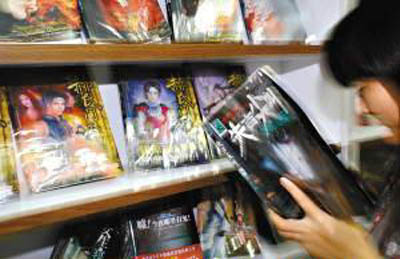
Murky standards
But both Yang and Du admit that some horror films are downright unpleasant and nasty. "I don't like the movies that are full of just graphic scenarios," says Du.
Their reasoned defense of the genre has highlighted what is perceived to be a huge generational divide, into which the GAPP drove a giant wedge with its ban.
In its public announcement early last month, the GAPP claimed that it had received many complaints from parents and experts voicing their concern over the prevalence of horror or supernatural videos.An all-out ban was necessary "to keep the negative impact at bay and protect the mental and physical health of adolescents".
This echoed its earlier crackdown on the Death Note books and films, when it said the Japanese series "poisons young minds". During a two-month whirlwind campaign, the GAPP confiscated 5,912 books and 1,364 DVDs.
When asked to elaborate on the so-called "negative impact", the GAPP refused to comment, nor would it discuss its decision-making process or crackdowns.
Professor Li Daoxin, of Peking University, defends the GAPP's decision as understandable. "The cultural administration cannot turn a blind eye to the influx of horror films, which have gone beyond the common acceptance of the public."
Li, who started to research the genre in the 1990s, argues the impact of such movies on adolescent minds should not be underestimated.
Wang Lirong, a psychology teacher at Beijing's Jili University, shares Li's view, saying horror movies can harm young people's perceptions of the world.
"Many horror movies describe supernatural matters that are basically out of human control. However, it is very important for the young to foster a sense of control before they develop their steady ego. Too much exposure to horror movies may make them feel doubtful about their lives and make them question their ability to cope," she explains.
Even scary movie fan Du recalls what happened after his cousin watched the movie Mysterious Mirror when she was in primary school."She didn't dare to stay home alone in the evening or look into the mirror. Her mother had to accompany her to the toilet. She was like that for a fortnight before she got over it."
Yang also admits that horror movies have a "more or less" negative impact on young minds, but not so bad as the negative impacts of real life. "We're not living in vacuum, and the evil side our social environment is much more terrible than horror movies, right?"
In spite of the ban's seemingly clear target, it is difficult to define exactly what is to be prohibited.
"Harry Potter and Strange Tales from A Scholar's Studio are not on the list, but the standards remain murky," says a shop assistant who identifies himself as Mr. Xuan at Big World Audio-video Product Shop in downtown Beijing. "It's hard to judge whether a movie has the sole purpose of seeking to arouse terror and horror."
Adult audiences have also expressed their dissatisfaction. A survey conducted by the portal site Sina.com suggests that only 15 percent of the 2000-plus people interviewed online supported the ban, while four out of five disapproved on the grounds that their right to watch horror movies was totally disregarded.